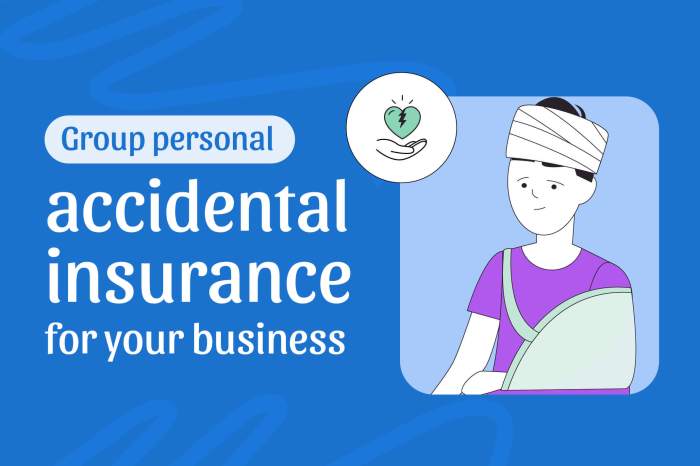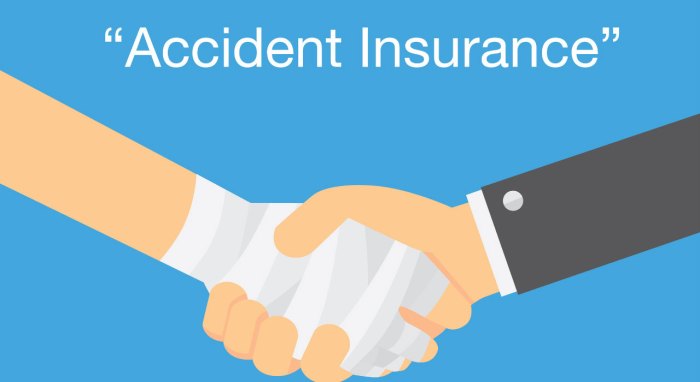
Life’s unpredictable nature often throws curveballs, leaving us vulnerable to unforeseen accidents. Accidental insurance, a crucial safety net in these situations, offers financial protection against the unexpected costs and consequences of accidents. This comprehensive guide delves into the intricacies of accidental insurance, exploring its various types, benefits, and the crucial factors to consider when choosing a policy that best suits your individual needs.
From defining the core concept and outlining key differences from other insurance types like health and life insurance, we’ll journey through the claim process, premium factors, and the ultimate advantages and limitations of this essential coverage. We aim to equip you with the knowledge necessary to make informed decisions about securing your financial well-being in the face of unforeseen events.
Defining Accidental Insurance

Accidental insurance, also known as personal accident insurance, provides financial protection against unforeseen injuries or death resulting from accidents. Its primary purpose is to offer financial compensation to the policyholder or their beneficiaries in the event of an accident-related mishap, alleviating the financial burden associated with medical expenses, lost income, and other related costs. This type of insurance differs significantly from other forms of coverage, focusing solely on accidental events rather than broader health or life circumstances.
Accidental insurance policies typically cover a range of events, offering financial relief in various scenarios. The specific coverage varies depending on the policy, but common examples include accidental death, dismemberment, and permanent or temporary disability. Many policies also cover medical expenses incurred as a direct result of the accident, including hospital stays, surgeries, and rehabilitation. Some policies may even include additional benefits such as ambulance fees, emergency medical evacuation, and repatriation.
Accidental Insurance Compared to Other Insurance Types
Accidental insurance is distinct from both health and life insurance, though it can complement these forms of coverage. Unlike health insurance, which covers a wider range of illnesses and injuries, regardless of their cause, accidental insurance focuses exclusively on injuries and death resulting from accidents. Similarly, while life insurance provides a death benefit regardless of cause, accidental insurance only pays out if the death is a direct result of an accident. Health insurance addresses illness and injury, encompassing both accidents and disease. Life insurance provides a lump sum payment upon the death of the insured, irrespective of the cause. Accidental insurance, conversely, provides benefits specifically for injuries or death caused by accidents.
Comparison of Insurance Types
The following table summarizes the key differences between accidental, health, and life insurance:
| Coverage Type | Coverage Details | Claim Process | Cost Factors |
|---|---|---|---|
| Accidental Insurance | Accidental death, dismemberment, disability, medical expenses resulting from accidents. | Requires proof of accident and resulting injuries/death. Documentation of medical expenses is typically needed. | Age, occupation, level of coverage, and the presence of pre-existing conditions can impact cost. |
| Health Insurance | Covers a wide range of illnesses, injuries, and medical expenses, regardless of cause. | Requires medical documentation and may involve pre-authorization for certain procedures. | Age, health status, coverage level, and the chosen plan all influence premiums. |
| Life Insurance | Provides a death benefit to beneficiaries upon the death of the insured. | Requires proof of death, often involving a death certificate and policy documentation. | Age, health status, coverage amount, and policy type significantly affect cost. |
Types of Accidental Insurance Coverage

Accidental insurance policies offer a safety net against unforeseen events, providing financial protection and peace of mind. Understanding the various types of coverage available is crucial in selecting a policy that best suits your individual needs and risk profile. The specifics of coverage vary significantly depending on the insurer and the chosen plan.
Different types of accidental insurance policies cater to specific needs and circumstances. Some policies focus solely on death benefits, while others offer broader coverage encompassing disability and medical expenses. Understanding these distinctions is key to making an informed decision.
Accidental Death Benefit
This type of policy provides a lump-sum payment to designated beneficiaries in the event of the policyholder’s death resulting from an accident. The payout amount is typically a fixed sum, specified in the policy document. This benefit can help cover funeral expenses, outstanding debts, or provide financial support for dependents. For example, a $100,000 accidental death benefit policy would provide $100,000 to the beneficiary upon the insured’s accidental death. Coverage limits vary widely, ranging from a few thousand dollars to millions, depending on the policy and the premium paid. Exclusions usually involve deaths caused by pre-existing conditions, suicide, or self-inflicted injuries.
Accidental Disability Benefit
Accidental disability insurance provides financial support if an accident leaves the policyholder unable to work. This benefit typically pays a monthly income replacement, helping to cover living expenses while the individual recovers. The amount paid depends on the policy’s terms, often expressed as a percentage of the policyholder’s income, with a maximum payout cap. For instance, a policy might offer 60% of the insured’s income, up to a maximum of $5,000 per month, for a specified duration, such as two years. Exclusions commonly include pre-existing conditions, illnesses not resulting from an accident, and participation in high-risk activities not explicitly covered.
Accidental Medical Expense Coverage
This coverage reimburses the policyholder for medical expenses incurred as a result of an accident. This can include hospital bills, surgery costs, rehabilitation expenses, and other related medical treatments. The policy may have a maximum payout limit for a single accident or a lifetime limit. A policy might cover up to $50,000 in medical expenses per accident, with a lifetime maximum of $250,000. Common exclusions include pre-existing conditions, cosmetic procedures, and routine check-ups not directly related to an accident. Some policies may also have a deductible, meaning the policyholder must pay a certain amount out-of-pocket before the insurance coverage begins.
Comparison of Coverage Limits and Exclusions
The following table summarizes key features of different accidental insurance plans. It’s crucial to remember that specific terms and conditions will vary significantly based on the insurer and the individual policy.
| Policy Type | Coverage Limits | Common Exclusions |
|---|---|---|
| Accidental Death Benefit | Varies widely, from a few thousand to millions of dollars. | Pre-existing conditions, suicide, self-inflicted injuries. |
| Accidental Disability Benefit | Percentage of income, with maximum monthly and total payout limits. | Pre-existing conditions, illnesses not resulting from an accident, high-risk activities. |
| Accidental Medical Expense Coverage | Maximum payout per accident and lifetime limits; deductibles may apply. | Pre-existing conditions, cosmetic procedures, routine check-ups unrelated to an accident. |
Factors Affecting Accidental Insurance Premiums

The cost of accidental insurance, like any insurance product, isn’t arbitrary. Several interconnected factors determine the premium you’ll pay. Understanding these factors empowers you to make informed decisions about your coverage and budget. This section will delve into the key elements influencing your accidental insurance premium.
Several key factors significantly influence the cost of your accidental insurance premiums. These factors are often assessed individually but work in concert to determine the final price. Understanding these allows for a more informed choice regarding your coverage.
Age
Age is a significant factor in determining accidental insurance premiums. Statistically, older individuals are considered to be at a higher risk of accidents and related health complications. Therefore, insurers generally charge older applicants higher premiums to reflect this increased risk. For example, a 65-year-old applying for accidental insurance might pay significantly more than a 25-year-old, even with identical coverage amounts. This difference reflects the actuarial data showing a higher likelihood of accidents and claims among older age groups.
Health Status
An applicant’s pre-existing health conditions and overall health status heavily influence premium calculations. Individuals with pre-existing conditions that might increase their risk of accidents or complications from injuries often face higher premiums. For instance, someone with a history of heart conditions might pay more than a healthy individual, as the insurer anticipates a greater chance of a claim related to a health event triggered by an accident. Comprehensive medical history is crucial in the underwriting process.
Coverage Amount
The amount of coverage you choose directly impacts your premium. Higher coverage amounts naturally lead to higher premiums because the insurer is assuming greater financial responsibility in the event of a claim. Someone opting for a $1 million accidental death benefit will inevitably pay more than someone choosing a $100,000 benefit. This is a simple correlation: higher payout potential means higher cost.
Comparison Across Insurance Providers
Premium rates vary significantly across different insurance providers. Competition, internal risk assessment models, and administrative costs all contribute to this disparity. It’s crucial to compare quotes from multiple insurers before making a decision. For example, one company might prioritize accident-related hospital stays in its coverage, while another might focus on death benefits. This difference in coverage focus can lead to varying premiums even for similar coverage amounts.
| Factor | Impact on Premium | Example | Mitigation Strategy |
|---|---|---|---|
| Age | Higher age generally leads to higher premiums due to increased risk. | A 60-year-old pays more than a 30-year-old for the same coverage. | Consider purchasing coverage earlier in life when premiums are lower. |
| Health Status | Pre-existing conditions or poor health can significantly increase premiums. | Someone with a history of heart problems pays more than a healthy individual. | Maintain a healthy lifestyle and disclose medical history accurately. |
| Coverage Amount | Higher coverage amounts result in higher premiums. | $1 million coverage costs more than $100,000 coverage. | Choose a coverage amount that balances your needs and budget. |
| Insurance Provider | Premiums vary significantly between insurers due to different risk assessments and operating costs. | Insurer A charges $50 per month while Insurer B charges $75 for similar coverage. | Compare quotes from multiple insurers before selecting a policy. |
Final Review
Securing adequate accidental insurance is a proactive step towards safeguarding your financial future against the unexpected. By understanding the nuances of different policy types, the claim process, and the factors influencing premiums, you can make informed choices to protect yourself and your loved ones. Remember to carefully compare policies, consider your individual needs, and prioritize a plan that provides comprehensive coverage tailored to your specific circumstances. Don’t leave your financial security to chance – take control with a well-informed approach to accidental insurance.
Questions Often Asked
What is the difference between accidental insurance and health insurance?
Accidental insurance primarily covers injuries or death resulting from accidents, while health insurance covers a broader range of illnesses and medical expenses, regardless of the cause.
Can I claim accidental insurance if I’m already covered by my employer’s health insurance?
Yes, many people carry both. Accidental insurance often provides supplemental coverage for specific accident-related expenses not fully covered by health insurance, such as disability income or specific accident-related medical costs.
What happens if my claim is denied?
If your claim is denied, carefully review the denial reason and the policy terms. You may be able to appeal the decision or provide additional documentation to support your claim. Consult your insurance provider to understand the appeals process.
How long does it typically take to process an accidental insurance claim?
Processing times vary depending on the insurance provider and the complexity of the claim. However, you can generally expect a response within a few weeks to a few months.